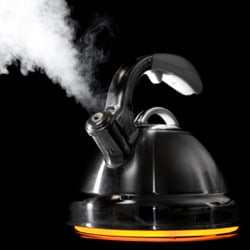
Preventing scald burns
7 November 2013
- Hot liquids, such as coffee, tea, soup and hot water, are the most common cause of burns in young children
- A child’s skin is more sensitive to hot temperatures than adult skin, therefore burns quicker
- 75% of all scald burns involve children under 4 years old age
In the Bathroom
- Check the water temperature before putting children in a bathtub. The safest temperature for bathing is about 100ºF (37ºC)
- Seat the children facing away from the faucets so they cannot reach them
In the Kitchen
- Turn all pot/pan handles inward when cooking
- Discourage your toddler from helping you cook at the stove
- Make sure the electrical cord of a kettle is not within children’s reach
- Keep all hot liquids out of reach of children, do not place them on low coffee or end tables
- Use non-slip placemats instead of tablecloths as children will pull on them
- When removing lid from hot food, remember that steam may have accumulated. Lift the cover or lid away from the face and arms
- Stir and test food from the microwave before tasting, as the food heats unevenly and the temperature can get very high.
- Never heat baby bottles of formula or milk in the microwave, especially those with plastic bottle liners, they can burst, pouring scalding liquids onto the baby.
Other Considerations
- Set your hot water heater 60C and have a plumber install mixing valves to lower the temperature of water at the faucet to 49C (Hydro Quebec, 2015)
- Avoid carrying or picking up a child when holding hot liquids
- Never heat baby bottles of formula or milk in the microwave, especially those with plastic bottle liners, they can burst, pouring scalding liquids onto the baby.
- Do not put hot drinks in cup holders on baby carriage
In case of a burn
- Remove all diapers and clothing from around the burn area. If material is adherent (stuck) to the skin, cool the area with lukewarm water and seek medical attention.
- Run lukewarm—not cold—water over the burn area for a few minutes. A cool wet towel can also be applied.
- Never apply ice to the burn. This can make the burn worse.
- Never apply creams, ointments or salves or butter
- Never break blisters
- Cover with a clean dry cloth
- Go to the nearest Emergency Department, or call 911 if it is severe
Reviewed by Trauma Specialists
March 2020
This page needs an update? Report it here!
